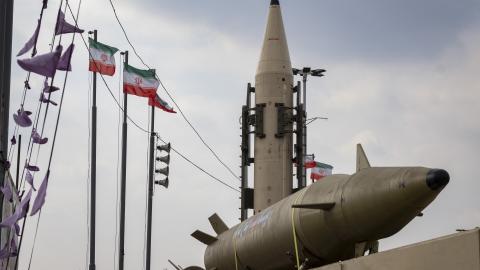The following text is adapted from a briefing on April 16. It has been edited for clarity.
Iran’s Intentions and Israel’s Response
Let’s start with the impact of the attack. Of course, it’s being hailed by the Joe Biden White House as a great success. Some Israelis are saying the same thing and are breathing a sigh of relief. An Israeli friend of mine, a former commando, told me, the morning after, “I can’t believe how insignificant it turned out to be.”
There’s no doubt that this was a technical military success by the Israelis and by the American-led coalition. The Iranians launched some 350 drones, cruise missiles, and ballistic missiles at the Israelis. The interception rate was phenomenal, demonstrating tremendous prowess. The Israelis and the Biden administration have every right to feel good about it.
But the Biden administration is making a broader claim, namely, that this was a strategic success. I think it was anything but that. It was a technical military success, yes, but the fact that the attack even took place was a clear failure by the United States—a failure of deterrence. President Biden, since he took office, has been trying to improve relations with Iran and to calm tensions in the region through outreach to Tehran and allowing Iran to sell oil to China. To use the language of the administration, Biden has been “de-escalating,” engaging in “dialogue” and “diplomacy,” and pursuing “regional integration.” This approach has failed.
The Failure of American and Israeli Deterrence
It was also a failure of the stated policy immediately after October 7, when the administration worked hard, including by reaching out to Iran, to prevent a widening of the war. Iran has escalated several times, through Hezbollah, the Houthis, and its proxies in Iraq and Yemen. And now it has launched a direct attack from its own soil. Our Hudson colleague, Can Kasapoğlu, an open-source military analyst, produced an insightful report, an immediate report on this attack, which I would encourage everyone to read. The gist is that Iran has developed an offense-dominant capability. These drones, cruise missiles, and ballistic missiles, when launched together in a single strike package, are very difficult to defend against. They favor offensive action. Israeli defenses were indeed successful this weekend, but the Israelis spent $1.5 billion in repelling this. That’s just the Israelis, not the whole coalition.
The Iranians made clear that Saturday night was just a taste. They have the capacity to maintain this operational tempo for a week or two weeks if they wanted to, probably much longer. They can even keep up this tempo against Israel while also supplying Russia in Ukraine with attack drones. Israel would not have enough interceptors to shoot down all the missiles. And it wouldn’t enjoy a near-perfect interception rate every night. Nor would it have the money to pay for the defense against a sustained Iranian campaign. The economics just don’t work. The only way you can counter an offense-dominant regime is through offensive operations.
In Tehran, no doubt, they were disappointed by the penetration rate of Iran’s missiles, by the failure to do serious damage to any major targets. But the Iranians are playing a political-military game. They elicited an American response that pleased them very much. The Americans are restraining Israel. When the Israelis saw the Iranians getting ready to launch, Jerusalem prepared to preempt, and Biden said, “Don’t!” And then after the Israelis absorbed this attack, Jerusalem prepared to go on the counterattack and Biden again said, “Don’t!”
And let’s not forget. These efforts to restrain Israel come immediately after Biden enforced restraint on Prime Minister Benjamin Netanyahu in Gaza. The president pressured the Israelis not to launch a campaign in Rafah and to make concessions to Hamas to arrive at a ceasefire.
The Biden Doctrine
To steal a line from Edward Luttwak, we have a Biden Doctrine now: Iran is permitted to hit any country it wants with ballistic missiles, cruise missiles, and drones, but no one, including the United States, is permitted to hit Iran back. Even when Iran hits American forces through proxies, the United States will not kill Iranians. The US only killed Arabs when responding to the Houthis or to the militias in Iraq and Syria. It took care not to kill the Iranian liaison officers supplying the proxies.
So a corollary to the Biden Doctrine states that the United States can deter Iran by killing Arabs. But it won’t work. The only way to deter Iranians is by taking from them something that they truly hold dear. They do not hold Arab lives dear.
Biden’s De-escalation
Let’s analyze Saturday’s attack as the outcome of a bilateral Israeli-Iranian dynamic. The Iranians tried to exploit the Gaza conflict by delivering weapons to the West Bank and activating cells there. Israel foiled these Iranian operations but regarded them as an escalation, a changing of the rules of the game. It retaliated by killing General Mohammad Reza Zahedi in Damascus on April 1. The Iranians responded by attacking Israel directly. Now, this direct attack is a total change in the rules of the game. Iran and Israel have long engaged in a shadow war, but this is something totally different.
Of course, the Iranians were aware that coming out from behind their proxies and hitting Israel from Iran proper was a major escalation that entailed serious risks. The goal of their diplomacy before the strike, therefore, was to normalize this mode of action—to receive international legitimacy for striking Israel directly from Iranian territory. With that goal in mind, they telegraphed the attack ahead of time, and they negotiated it, in a sense, with the Americans. I’ve seen some people saying on social media that the Americans approved specific targets and so forth. That didn’t happen, in my opinion. I can’t imagine that that could possibly have happened.
But there was this exchange of messages through the Turks, in which Biden urged restraint, and signaled that the United States would not itself respond to Iran. That was the key message the Iranians wanted to hear: that the United States wasn’t going to come in behind Israel and attack Iran. So, Tehran pocketed that assurance. Then after the attack, Biden not only urged restraint on the Israelis but also said publicly that the United States will not itself take part in any offensive actions against the Iranians. That statement was a big mistake in my mind. Even if Biden had no intention of acting, what did he gain by telegraphing his intentions? You should keep your enemy guessing. When you tell him what you won’t do, you just encourage him to escalate.
Biden Restrains Netanyahu
Having said all this, I assume the White House understands that, despite its pressure, the Israelis have no choice but to respond to the Iranians. So, Biden is now telling the Israelis, “Don’t surprise us. Let us know what targets you’re going to hit.” The Americans are demanding pre-approval rights. That’s just another way of suppressing the counterattack. They want the Israelis, if they do go forward, to be very restrained in their response.
All this pressure puts Netanyahu in a very difficult place. As I read the Israelis, they must do something. Otherwise, Iran just changed the rules of the game with no consequences. It wasn’t penalized internationally in any way for what it did. I just read a Bloomberg report saying that the Chinese foreign minister came out and said that cooperation with Iran will move forward or expand.
He also said something to the effect that Iran was within its rights to attack Israel. The Chinese statement was another fruit of Iran’s pre-attack diplomacy. The Iranians took care to justify the attack in terms of self-defense and international law. They made a point of stressing that they were only hitting military targets. Again, that diplomacy was designed to get the Chinese, the Americans, the Russians to accept the idea that Iran can hit Israel directly with no international consequences.
The Appeasement Strategy
The American media is full of headlines this morning saying that no damage was done to Israel and questioning of the wisdom of Israel’s striking back. Those headline writers took their cues from the Biden White House, which is stressing that any Israeli response is some kind of unwarranted escalation.
These headlines are reminiscent of President Barack Obama’s echo chamber, the vast network of media and think tank mouthpieces that Obama created to legitimate his Iran outreach. The Biden White House runs the same play over and over. Iran always gets a pass, in order to preserve “The Realignment,” which is what I call the appeasement policy, and which transforms the United States from the leader of an anti-Iran coalition into a mediator between Iran and America’s traditional allies. According to the Realignment, the ally’s anti-Iran inclinations are always the problem—whether it’s Saudi Arabia or Israel or someone else. Our ally is always trying to do something that’s an unwarranted provocation to the Iranians, an act of aggression that is going to draw the United States into a war. The wiser approach, so the Biden thinking goes, is for our ally just to calm down—to de-escalate.
Unintended Consequences
Let’s go back to Monday, April 1, when the Israelis killed General Zahedi, a senior commander in the Quds Force, the foreign operations arm of the Revolutionary Guards. They killed Zahedi in Damascus. That was the same day that the Israelis also accidentally killed the World Central Kitchen humanitarian assistance providers.
The following Thursday, April 4, Biden called Netanyahu and read him the riot act. He demanded that Netanyahu: allow more humanitarian supplies into Gaza; send an empowered negotiating team to Cairo; and refrain from occupying Rafah to finish off Hamas. Most importantly, Biden insisted that Israel make the necessary concessions to cut a hostages-for-prisoners deal that would allow for a ceasefire. Netanyahu complied. He immediately pulled all the Israeli maneuver forces out of Gaza, opened the gates to allow more humanitarian aid, and sent an empowered negotiating team to Cairo.
But the law of unintended consequences intervened. The more pressure Biden puts on Israel, the more he incentivizes the Iranians to escalate, to exploit the rift between Washington and Jerusalem. Biden also incentivizes Hamas to hold out for more. Indeed, in the last two weeks, Hamas has increased its demands on Israel. It’s now offering fewer hostages to be released and demanding, in effect, capitulation by Israel in Gaza. So, Biden brought unprecedented pressure to bear on its ally and got less than nothing in return. Our enemy, Hamas, pocketed all the American pressure on Israel and then demanded more. And Iran attacked.
To Counterattack or Not to Counterattack?
As for Netanyahu, he and his war cabinet are now deliberating. Three lines of thought are guiding their debate. First, they’re saying, “Okay, we must hit back and hurt the Iranians so badly that they feel they paid a price. That means we must strike inside Iran itself. At the same time, however, the pressure from the Americans for restraint is significant. So, if we launch an operation inside Iran, it should be low-signature. We should take something valuable from Iran but without making a big bang.”
Second, they’re asking themselves, “What’s our urgent priority right now? It’s that we finish the job in Gaza.” So, they’re asking, “Can we leverage all this pressure that the Americans are putting on us for restraint, and trade our compliance in return for a green light to finish the job in Rafah?” And third, they’re asking, “Can we change the balance of power with Hezbollah in Lebanon?”
Hezbollah constitutes the biggest military threat to Israel. It’s bigger than the threat from Iran directly. Israel evacuated its cities and towns in the north along the border because of the attacks. Hezbollah hung back somewhat over the weekend, precisely because Iranian Supreme Leader Ali Khamenei and Nasrallah, the Hezbollah leader, did not want Iran’s unprecedented attack on Israel to legitimate a major counterattack in Lebanon—legitimate in the eyes of Washington, I mean.
But the Israelis would be smart to find a way to shift the balance of power significantly against Hezbollah and to finish the job in Rafah—goals that entail serious negotiations with Washington.
America’s Arab Partners
Over the weekend, the Saudis and the Jordanians emerged, effectively, as allies of the Israelis against the Iranian attack. Despite all the animosity in the Arab world that Israel’s Gaza campaign has stirred up, Arab leaders want Hamas to be destroyed. That’s what they want. None of them can say as much publicly. Nor can they lobby Washington too hard on that score, because they all have their own bilateral needs from the Americans, who are now working to bring the war to an end.
The Arab states see how the Biden administration has its heart set on the two-state solution and its commitment to a revitalized Palestinian Authority providing a pathway to an independent Palestinian state. On that score, the Biden administration is leveraging Saudi Arabia against the Israelis. It’s dangling out Saudi normalization before Netanyahu to compel him to make concessions to the Palestinian Authority. But when you start talking about Palestinians to Mohamed bin Salman, the crown prince of Saudi Arabia, the de facto ruler, he falls asleep.
When it comes to Palestine, he has narcolepsy. He doesn’t care. Well, that’s an exaggeration. He cares somewhat, because his own people care, at least to a certain extent. He wants to remain in tune with them. Personally, however, he takes no interest in what’s going on in Gaza. As for Mahmoud Abbas, Mohamed bin Salman thinks he’s a zero. And he certainly despises Hamas and would like to see it destroyed.
The biggest worry here is Jordan. The threat to Jordan is one of the reasons why we should not look at what happened over the weekend and say, “Oh, big win, great success, hurray for the coalition against Iran!” We should not agree with all the nonsense that the Biden administration is putting out.
Jordan is now in the crosshairs. You will recall that it was in Jordan that Iran killed three Americans and wounded over forty more. Tehran chose its venue carefully. It chose Jordan because the population is overwhelmingly Palestinian, sympathetic to the Gazans, and hostile to Israel. By forcing Jordan to raise its head above the parapet to protect Israel from Iran’s aerial bombardment, the Iranians exacerbated existing tensions, inside Jordan, between regime and society.
Over the next few months, I predict an Iranian propaganda campaign against King Abdullah of Jordan. We’re going to see tensions on the streets of Amman between, on the one hand, the East Bankers, the Bedouin tribesmen who are loyal to the king and the state and, on the other, the Palestinians. The Muslim Brotherhood, which is backed by the Iranians, can be relied upon to stir things up. It’s likely to get very tense in Jordan.
There’s an analogy to be made here to the misguided body counts in the Vietnam War. You will recall that the American military counted the number of Viet Cong killed, seeing a high body count as a metric of success rather than analyzing the war from a political-military standpoint. Iran’s attack on Israel over the weekend was unsuccessful in a purely technical sense. It did no significant military damage. As a political act, however, the Iranians chalked up many successes. As I already mentioned, the solicitous American policy—the Iranians are delighted over that. The impact on Jordan—they’re delighted with that. There’s a lot of combustible material in the Middle East for them to light on fire.
Biden’s Electoral Strategy
What would I do if I were Biden? It’s hard to say, because I wonder how much of his worldview I must accept when playing him. If I were president of the United States, and playing myself, I would put together a coalition explicitly designed to take from Iran things that it holds dear in return for all its aggressive behavior. I would hold it responsible for the attacks of its proxies, as well as for its own behavior. I would start, number one, by destroying its oil sales. I would send a very clear message about my intentions toward the regime, in general, simply by enforcing the sanctions that are still on the books. The Biden administration is of course ignoring the law and allowing Iran to sell unprecedented amounts of oil to China.
Biden will not end those sales, because he wants oil prices to remain low before the election. He wants to keep Iranian oil on the market. His global energy strategy seeks to reduce carbon energy dependence. The administration will not support any new carbon energy initiatives. That policy puts countries like Iran in an advantageous situation. Biden also seeks to avoid escalation with Iran for fear it might rush for a nuclear weapon.
The United States has an unprecedentedly low number of troops in the Middle East. We have fewer troops in the Middle East probably than at any time since 2001. I say “probably” because we surged some troops after October 7, and I don’t know what the exact number is right now. But Biden certainly doesn’t want to carry out any military actions in the Middle East—let’s leave it at that.
Biden doesn’t want to take Iranian oil off the market. He doesn’t want to see Iran rush for a bomb. And he doesn’t want to augment the forces to deter Tehran with our military capabilities. He feels that all those things will tank his election chances. The Iranians read all these inclinations as weakness. In Tehran, they’re convinced that now’s the time to revise the whole international order in the Middle East, and to drive a wedge between the US and Israel.
When Joe Biden contemplates all the things he doesn’t want to do and considers the pressure the Iranian attacks are putting on him, he concludes that his best solution for de-escalating is to pressure the Israelis to stop the war in Gaza. With respect to the election, a ceasefire makes all the immediate problems go away, or at least seem to go away, at minimal cost to him.














